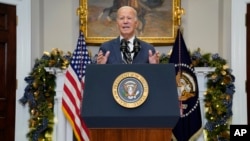Republican lawmakers in the U.S. Senate on Wednesday blocked $110 billion in aid for Ukraine and Israel, as well as some security measures for the U.S. southern border to curb surging, unchecked migration from Mexico into the U.S.
The vote of 49-51 did not reach the 60-vote threshold needed to move ahead. Biden had asked Congress for almost $106 billion to fund the wars and border needs. The Democrats tried to move the legislation forward, but Republicans said they would not support it without big changes to border policy.
Senate Minority Leader Mitch McConnell, who supports Ukraine aid, told his party members to reject the aid package because it did not include policy changes, something lawmakers have fought over for years.
Earlier Wednesday, President Joe Biden implored Congress to approve more arms aid for Ukraine, saying that failing to pass the assistance would be the “greatest gift” the United States could hand Russian President Vladimir Putin in Putin’s nearly two-year war against the neighboring country.
At the same time, the U.S. Defense Department announced new security assistance for Ukraine that is the Biden administration's 52nd allotment of equipment for Ukraine since August of 2021. It contains air defense capabilities, artillery ammunition, anti-tank weapons and other equipment.
The $175 million military aid package includes guided missiles for the High Mobility Artillery Rocket Systems, or HIMARS, anti-armor systems, and high-speed anti-radiation missiles, according to the Pentagon and State Department.
Speaking briefly at the White House, the U.S. leader said that if Putin defeats Ukraine, "it won't stop there," and Moscow would invade neighboring NATO countries the U.S. is legally bound to defend.
"If NATO is attacked," Biden said, "We'll have American troops fighting Russian troops. We can't let Putin win."
With the new tranche of aid, Biden emphasized in a statement that "security assistance for Ukraine is a smart investment in our national security. It helps to prevent a larger war in the region and deter potential aggression elsewhere."
Biden spoke hours before a crucial initial vote in the Senate to provide $110 billion in aid for Ukraine, along with Israel and U.S. southern border security to curb surging, unchecked migration from Mexico into the U.S.
Some Republican lawmakers in both the Senate and House of Representatives have balked at approving the additional Ukraine assistance without adopting much stricter U.S.-Mexico border controls, such as blocking all illegal migration.
Biden said, "I support real solutions at the border … to fix the broken immigration system," but called for a compromise with opposition Republicans, not blanket acceptance of shutting the border, one of the demands of some Republicans.
The president said Republicans "have to decide whether they want a political solution or a real solution. This has to be a compromise."
"Petty, partisan, angry politics can't get in the way of more support for Ukraine," he said. "I'm calling on Congress to do the right thing for Ukraine: Stand with Ukraine."
Meanwhile, Ukrainian President Volodymyr Zelenskyy appeared Wednesday before a virtual meeting of leaders from the Group of Seven leading industrialized nations.
Zelenskyy had the opportunity to brief the leaders on the stalemated war in Ukraine, with Kyiv's counteroffensive stalled in the eastern part of the country. The United States and other wealthy nations have provided most of the military and humanitarian support for Ukraine.
Wednesday's meeting comes a day after Zelenskyy canceled a video appearance with members of the U.S. Senate, where he was expected to advocate for continued military support. Instead, key Biden aides made the case for more Ukraine aid, but at least 10 Republican lawmakers walked out of the meeting to protest lack of any Biden administration discussion about U.S.-Mexico border security.
Office of Management and Budget Director Shalanda Young warned in a letter to congressional leaders Monday that by the end of the year, the United States will no longer have the funds to send weapons and assistance to Ukraine.
On the battlefield, Ukraine's air force said Wednesday that Russia attacked overnight with 48 drones, with Ukrainian air defenses downing 41 of them.
Some information for this story came from The Associated Press, Agence France-Presse and Reuters.






